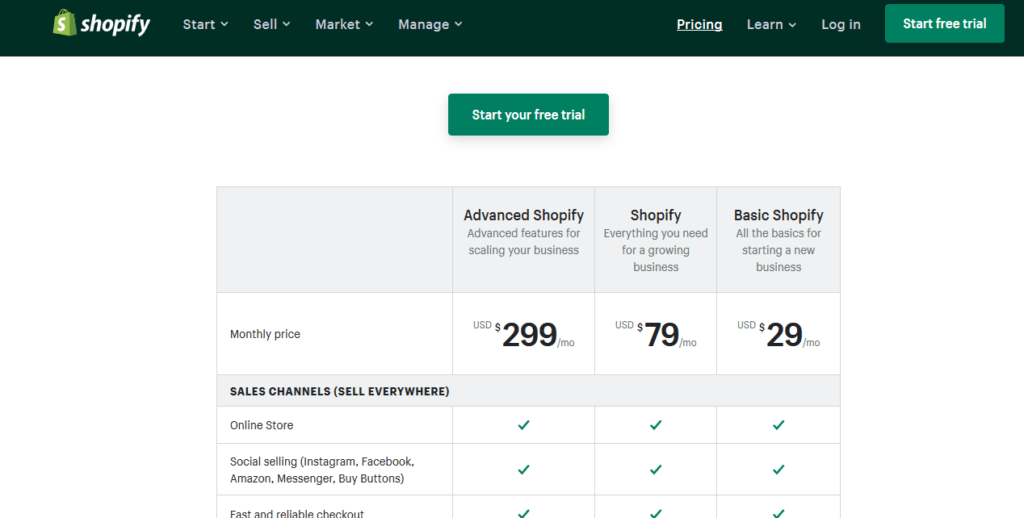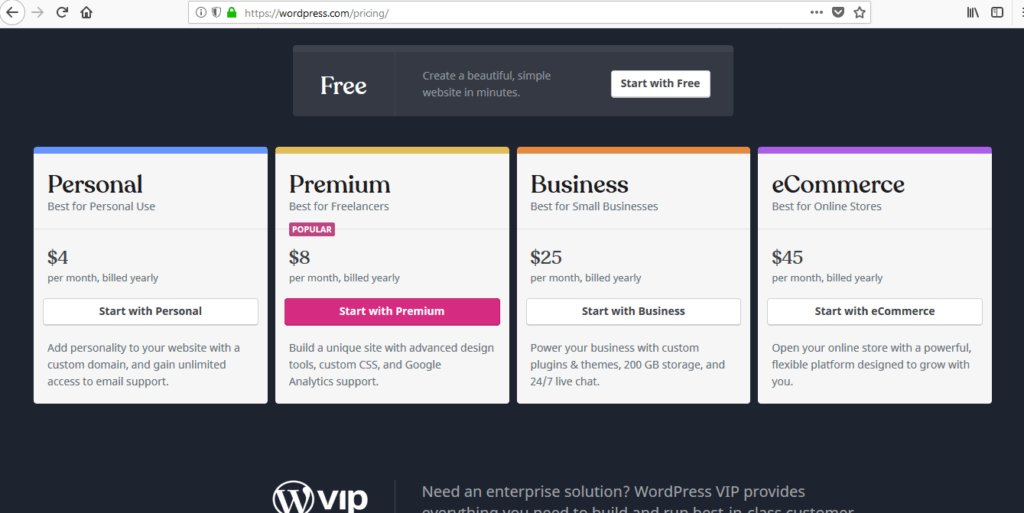Which is the best platform for startups building online stores? Shopify or WordPress? Shopify and WordPress are popular options for people who want to make their online stores.
In this article, let’s talk about the differences and the significance of each platform. Hopefully, in the end, you should have a much better idea of which platform will serve your business’ needs best.
Table of Contents
What Is Shopify
Shopify is a web application tailored to allow wholesalers to build and launch their online store. It’s possible to sell physical and digital goods online. It comes with a variety of customized templates to meet one’s business branding requirements.
Shopify is a user-friendly platform for creating an online store allowing users to explore that platform without any technical or design skills. You don’t need any coding skills. Although the platform also enables you to edit the HTML and CSS of your website, you will need advanced coding skills to customize their stores extensively.
Strengths and Weaknesses of Shopify
Strengths
- No Coding is needed or technical knowledge to use the Shopify platform
- Tailored for e-commerce websites
- No need to pay for hosting or security externally
Weaknesses
- Need to pay extra transaction fees (0.5% – 2% per transaction) unless you use Shopify’s payment gateway called Shopify Payments
- Need to reformat your website’s content if you want to change the template or theme of the website.
- Quite complicated to use because it is not as necessary or as simple to use as a drag-and-drop platform
What Is WordPress
WordPress is an open-source platform that allows anyone to create, use, or modify your website or blog for free. This platform is a content management system tool, especially with content that you don’t need to deal with heavy technical stuff about programming.
There are two different platforms. WordPress.com. and WordPress.org. For this article, we will look at WordPress.com.
In other words, this is a platform even for people who are not developers or have technical skills.
Strengths and Weaknesses of WordPress
Strengths
- It allows for total customization, which makes it more powerful and flexible than Shopify.
- Help support is a community base. There is a lot of information on the internet.
- “‘Gutenberg,” the new editor, makes it slightly more comfortable to use
Weaknesses
- To maximize WordPress, you will need some technical skills.
- It can get costly.
- It needs to source web hosting, security, and a domain name.
What is E-Commerce?
E-Commerce is defined as the business of buying and selling goods and services over the internet. The customers can make purchases from their computers as well as other touch points, including smartphones and smartwatches.
E-Commerce is thriving in both business-to-consumer (B2C) and business-to-business (B2B) sectors intended for most businesses to allow customers to purchase anything they want, at any time, from anywhere, using any digital device.
Read: The Ultimate Guide: Build Multiple Streams of Income
The Difference between Shopify and WordPress
Coding is the most significant difference between Shopify vs. WordPress. One of the main benefits of Shopify is you don’t need to know any coding.
On the other hand, WordPress is a little more complex platform because you need to know HTML codes. WordPress is such a vast platform. There are a lot of options for people on this platform.
Shopify and WordPress are different types of platforms that will differ in many ways. Read on to understand more about their difference.
Shopify Pricing

Shopify follows the “software as a service” (SaaS) model for payment. Shopify users pay monthly for a Shopify account and access the platform via the internet.
Shopify Monthly Plans:
- Basic Shopify
- Shopify
- Advanced Shopify
All Shopify Plans Include:
- Access to essential e-commerce tools and functionality
- 24/7 support with free support
- A 14-day free trial for all plans
- Hosting on Shopify’s servers is included (necessary and beneficial for those who do not want to find to host and configure their server)
The features on each Shopify plan vary, and here are a few key differences are as follows:
- A domain name that can be acquired from Shopify will run you around $10 to $20 annually. User access is restricted to the plan.
- The Shopify app marketplace has different integrations that will probably cost extra per month if you want to extend the functionality of your site further.
- Premium Site template – A premium site template will run you $100 – $200 more as a one time purchase.
- Transaction fees can be costly if you are not using Shopify Payments. As you increase your monthly plan, the credit card fees and transaction fees decrease.
- Shopify Lite – The ‘Lite’ plan allows you to embed a Shopify’ buy button’ on an existing site or sell via Facebook. You can’t get a fully functional store on this plan.
- Phone support is at $29 and higher plans, and not the cheaper plans.
- Point-of-Sale functionality allows you to use Shopify to sell at a physical location. This is an add-on: ‘Shopify POS Pro’ for $89 per month.
- The ‘Shopify Plus’ plan is aimed at larger organizations. They have more advanced requirements regarding APIs, server uptime, and support.
WordPress Pricing
There are a lot of variables entailed in building a WordPress website. The WordPress Content Management System (CMS) is free, but an e-commerce site is not. There are other things you’ll need to pay, namely:

WordPress Monthly Plans:
- Personal – $4/mo
- Premium – $8/mo
- Business – $25/mo
- E-commerce – $45/mo
WordPress features:
- WordPress hosting is a server space on which to install WordPress and store your site (required).
- A domain name (required)
- A Security Socket Layer (SSL) certificate is a digital certificate that provides authentication for a website and enables an encrypted connection.
- Paid plugins apps that can be added to your site to add more functionality
- A premium theme or template which refers to the design of your website
- E-commerce integration: there are the addition of tools that will let you sell products online
And of course, you may also need to hire a website developer to help you build your website depending on the direction of your business and technical knowledge and skills,
Overall, when it comes to comparing pricing between these two platforms, I can fairly say that if your business needs are simple, you should go for Shopify.
Shopify platform can work out cheaper compared to WordPress platform. WordPress is a “paid-for’ option and an open-source platform that can work out a lot more expensively.
To determine which platform is cheaper, I suggest making a list of the significant and added features of your website. Analyze and compare the price of your ideal Shopify plan with the total cost of an equivalent WordPress website.
Nonetheless, pricing should not be the only thing you consider in deciding what type of platform you want to use for your e-commerce business. It’s just as important to look at functionality and other features as well.
Which Provides Ease of Use and Quicker to Build A Website?
When it comes to creating online stores, many would agree that Shopify is undoubtedly the best and speedy option. Hosts your site for you and gives you all the tools you need.
WordPress is an open-source platform that needs to host your site and install plugins like WooCommerce for e-commerce tools.
In this feature, Shopify is the quicker option when it comes to build-time because everything you need is built-in.
Which platform is better for SEO?
SEO is about increasing your website’s visibility on search engines, like Yahoo, Google, AOL, and Bing is called SEO or Search Engine Optimization. SEO is essential for an online business that can easily attract and get new customers searching for what you sell on the internet.
Shopify empowers anyone in many ways, including adding specific titles and descriptions that appear in search results for each web page. You can also customize your web links or Uniform Resource Locator (URL) and site structure, so it’s easier for search engines to understand or ‘crawl.’
Read: Starting a Digital Business: What Do You Need To Know
WordPress has external plugins you can use to enhance your website. The most popular plugin is Yoast. WordPress is more flexible and offers many plugins. WordPress lets you have full control over SEO issues, but Shopify will restrict some parts of your business.
On this feature, both Shopify and WordPress platforms offer great success with SEO campaigns.
Which is Best in Customer Support?
Shopify’s customer support offers 24/7 support in a variety of ways, including by phone, email, live chat, and via Shopify’s onsite Help Center. Shopify Plan provides access to their very own merchant success manager, responsible for providing you with constant guidance.
WordPress, on the other hand, is somewhat different. There isn’t a call line. You will need to ask in forums and try figuring it out on your own. You can also search for different articles and videos with your questions.
Overall, Shopify does well with support. They can answer different questions and get your going. This can be important for businesses that are setting up their websites on their own. You don’t want to be bogged down by different technical issues.
Site and Security Maintenance
In dealing with internet technology, it is undeniable that you always have to consider the technical aspects of running a website, e.g., software updates, hosting, server configuration.
Shopify users don’t have to worry too much about site maintenance as it is taken care of by the company.
It’s a whole different story with WordPress because you have to ensure that you take charge of the following:
- An updated version of the WordPress platform
- The server has been configured correctly
- Updated plugins and templates
There may be some issues that can be taken care of automatically. Still, you always have to be keen on making sure you have the updated versions of the platform to avoid the vulnerability of being hacked into.
In terms of security features, with Shopify, the bulk of the responsibility for security lies with the companies that provide them. With WordPress, if you’re not paying a website developer to maintain your website, then the ultimate responsibility for security belongs to you.
There are some WordPress themes and plugins that can contain malicious code that can compromise the security of your website. Thus you have to be keen and careful about choosing which ones to install.
Lastly, you should adopt a systematic routine of backing up your site regularly. All that said, a well-constructed, well-maintained WordPress site will be extremely secure.
Frequently Asked Questions:
What is the difference between WordPress.com and WordPress.org?
WordPress.org is self hosted. It’s beneficial if you want full control and access to all different plugins. WordPress.com is hosted on WordPress.
What is the more simple solution for e-commerce: Shopify or WordPress?
Shopify is more simple for a lot of businesses. They have support for you to call and get help.
How do I get people on my e-commerce website?
Look at advertising and SEO. You can either pay to get in front of people or create engaging content that people search for.
